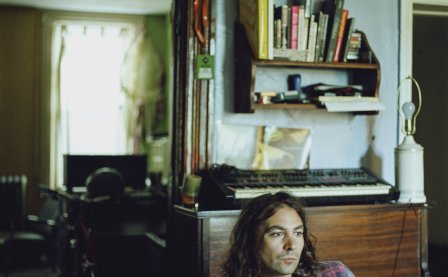It’s a rare moment when one hears something so inspired that they’re awoken from the narcotic somnolence of their typical music-listening routine, a half-awake state penetrated by no words or guitar solos, only a vague notion of the volume, feeling, and texture of what’s being heard. Listening to The War on Drugs’ A Deeper Understanding produces such a moment, one of breaking through the misty purgatory of half-commitments and partially-realized emotions, right on through to the realm of the essential forces that drive us, a place where fear and desire live as permanent neighbors. This record is a shimmering case study of the iron grip that melancholy has on the heavy soul that wants desperately to accept love. Beyond their meteoric guitar solos, exploding-heart drums, and silvery synths, The War on Drugs always lead us back to that familiar moment that we all know: the paralyzing convergence of passion and anxiety. This moment unfolds over the course of A Deeper Understanding and is guided by a new paradigm in the band’s collaborative powers, especially regarding the interplay of vocals, instrumental layering, and solos. As soon as the needle is dropped, we are pulled with a swift elegance back into the hazy incandescence of Adam Granduciel’s mind.
“The truth is in the dark,” Granduciel sings through the foggy reverb and cascading piano of “In Chains;” proceeding in axiom from the album’s artwork, where the singer works alone in his studio, his illuminated face and keyboard giving balance to the darkness that enshrouds him and vice versa, his words ring true. Their earlier albums were more personal projects, conceived mostly alone in dark rooms, great songs struggling to find their way toward richly realized collaborations; on their fourth, The War on Drugs has become a fully synergetic band. This development has allowed their music a new kind of movement, which has resulted in songs more fleshed-out and actualized than even those from their great 2014 release, Lost in the Dream.
The songs on A Deeper Understanding are often held together through the cooperation of individual motifs and ideas. On “Thinking of a Place,” the delicate union of sounds makes every second of its 11 minutes captivating. Individual lines weave in and out, sometimes overtaking one another, while other lines provide static foundations that allow the song to move forward. An organ emerges and then gives way to an electric guitar, which evaporates into a pedal steel that underscores Granduciel’s chorus. He sings, “And I’m thinking of a place/ And it feels so very real/ Just moving through the dark.” His words gracefully fade away into an extended, breezy guitar solo that somehow grasps the song’s imagery of the Missouri River in the distance, light changing on its water. Similarly, “Strangest Thing” takes the space it needs at every turn, guitars breathing and exhaling into the ethereal sighs of synths, pianos, and backing vocals. The song gradually crescendos, eventually reaching a feedback-tinged guitar solo.
The musical centerpieces of many of these songs are their nimble, beautiful solos. Historically, solos are meant to be statements of freedom, the musician reifying his or her creative spirit through an improvisation that bridges technique and vision. Especially in jazz and jam music, extended soloing is often sandwiched between repetitive song structures that, in some ways, throw into crisis the freedom purportedly achieved in the solo. In rock music, an instrumental break typically (but not always) falls in the last third of a song, before the final statement of the song’s themes, usually as another chorus or a coda. In The War on Drugs’ music, however, guitar solos often come across as the opposite: well-integrated interjections that don’t disrupt, but, rather, extend the style and flow of the song. This is because their solos tend to elongate a critical observation made in the lyrics. In the album’s upbeat, 1980s-infected opener “Up All Night,” Granduciel laments his struggle to fully commit to his relationship, singing about his paranoia, “It’s not some feeling I can break/ I keep raising up my/ I keep raising up my/ It’s not some feeling I can shake.” This reflection gives way to a desolate voice towering above all others: a distorted guitar, its minute-and-a-half solo a neon howl of loneliness through the dark. The same is true of “Pain,” where the conclusion of “I resist what I cannot change/ And I wanna find what can’t be found” produces another searing display of grating loneliness. These solos do not proclaim, “I am free.” No, the solos of Adam Granduciel say, “I want to be free,” and that’s something far more compelling.
Both claustrophobic and breathtakingly expansive, The War on Drugs’ latest effort is their best. There are, however, brief moments where the album’s seams show: the atmospheric “Clean Living” is a little too close for comfort in sound and feeling to “In Reverse,” while powerhouse jammer “Nothing To Find” takes its percussion and some of its guitar fills almost directly from “An Ocean in Between the Waves.” I also feel obliged, for better or worse, to point out its vintage Dylan-style musings like, “All my waiting was in vain/ I walked alone in pain/ Through the early morning rain.” But even with these minor concerns, A Deeper Understanding is easily one of the most satisfying guitar albums in recent memory, maintaining the feeling of being an original and important continuation of the American legacy of rock & roll. This isn’t only because the album’s music is great — it is — but, also, because it contains valuable, gripping moments of individuality and emotional honesty. It wants to teach us that the first step to freeing one’s self from pain is simply to acknowledge and listen to it. A Deeper Understanding supplements the question of whether we’re able to have meaningful relationships today with the questions of whether we should want to and whether we’re even committed enough to try. Understanding our desires and coming to recognize the things that prevent us from fulfilling them are the greatest tasks of being human, and Granduciel knows this. His is the music of someone who wants to be alive, and that’s something worth listening to.
More about: The War on Drugs




